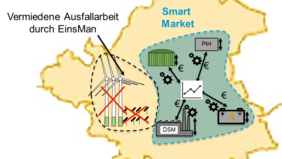The Energy System Technology Division of the Institute for New Energy Systems (InES) at Technische Hochschule Ingolstadt (THI) held the second workshop of the SmartBio project together with the associated project partners Stadtwerke Rosenheim (SWRO) and KWH Netz. Due to the current COVID19 situation the workshop was organized as an online seminar.
At first the 30 workshop participants from research and industry were introduced to the basic principle of a Smart Market. In lectures by project leader Prof. Uwe Holzhammer and scientist Tanja Mast, the methodology of market-based congestion management based on the THI Smart Market principle was presented. Temporarily limited to the duration of the congestion and regionally to the affected grid area, a further intelligent market is being established in addition to the "traditional electricity markets" (spot, futures and balancing markets). Financial incentives allow locally available flexibility options (loads and generation facilities) to contribute to the resolution of the grid bottleneck and to prevent or at least reduce the amount of curtailed RES electricity. The SmartBio research project focuses on biogas plants as actors on the Smart Market and analyses whether participation in Smart Markets can lead to an increase in revenue for these plants.
Furthermore, scientists Tanja Mast and Benedikt Hümmer presented the methodology behind the SmartBio analyses and current project results, which were afterwards discussed with the participants. One of the key findings is that biogas plants can contribute to the resolution of grid bottlenecks in different ways and to different extents, depending on their flexibility. Under certain conditions, additional revenues of up to 3.8 ct/kWh can be generated in the Smart Market, whereby the overall economic costs of congestion management through the Smart Market are lower than the currently established feed-in management. Furthermore, the quantities of renewable electricity currently lost due to curtailment could be used by the Smart Market. Very flexible biogas plants tend not to be operated at times of congestion due to low electricity prices at these times, which is why the Smart Market would rarely be an option for these plants today. ‘The Smart Market could become an interesting option for these plants in the future, if there is a greater focus on PV electricity generation in southern Germany. This development is likely to lead to an increase in regional grid bottlenecks due to electricity from solar energy, which flexible biogas plants can help to overcome if the nationwide electricity price is not at rock bottom due to supra-regional demand’, Prof. Holzhammer stated. These interactions will be examined in more detail in the course of the research project and will be presented in the final workshop in the first quarter of 2021.
Presentations on the virtual power plant of SWRO (Gilbert Vogler) and challenges of rural distribution network operators using the example of KWH Netz (Dr. Ulrich Schwarz) completed the workshop and were starting points for a dynamic exchange between the project team and participants.
The research project SmartBio is funded by Fachagentur Nachwachsende Rohstoffe e. V. (FNR) with funds from the Federal Ministry of Food and Agriculture (BMEL) and is located at the THI research branch in Neuburg an der Donau in the field of energy system technology.



![[Translate to English:] Logo Akkreditierungsrat: Systemakkreditiert](/fileadmin/_processed_/2/8/csm_AR-Siegel_Systemakkreditierung_bc4ea3377d.webp)








![[Translate to English:] Logo IHK Ausbildungsbetrieb 2023](/fileadmin/_processed_/6/0/csm_IHK_Ausbildungsbetrieb_digital_2023_6850f47537.webp)


